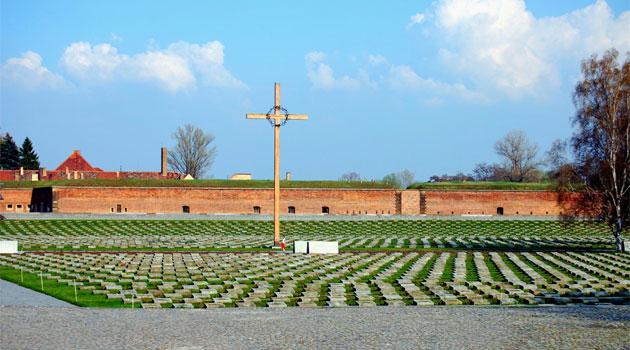Czech Republic: Terezín Commission refuses NGO request to officially fly the LGBTQ and Romani flags during commemoration

Jan Munk, the director of the Terezín Memorial who also chairs the Commission for the Preparation of the Terezín Commemoration, has refused a request from 14 organizations that the LGBTQ (rainbow) and Romani flags be flown next to the flags of various states during the 15 May event. "At the national cemetery in Terezín where this commemoration takes place, the flags of all the nations whose members fell victim to Nazi persecution and who passed through the concentration camps are flown during the commemoration ceremony. For many of those people, their distressing journey began by being transported to Terezín. To our great surprise, there is no Romani flag flown at Terezín even though, together with Jewish people, it is the Roma as a group who were affected most by Nazi persecution in the Czech lands," the organizations said in an open letter.
According to Munk and the rest of the Commission, however, there has been a misunderstanding. "The flags under discussion are not flags of nations whose members were the victims of Nazi persecution, but the flags of states that were part of the coalition of countries fighting against Nazism and countries whose citizens were imprisoned and murdered in the repressive facilities in nearby Litoměřice and at Terezín," the Commission responded in a letter which news server Romea.cz publishes in full translation below.
Munk told news server iDNES.cz that the problem is also the number of flagpoles at the cemetery. Each one is intended for a specific country.
"There is no more room there, we would have to take down one of the official flags, which is unthinkable," Munk said. According to him, the ceremony organizers do not want to open up space for the placement of flags that are not state flags at the National Cemetery because there is no doubt that would lead to other requests in that direction and would cast doubt on the overall concept of the commemorative assembly.
"Under no circumstances does this mean we are suppressing the commemoration of Romani victims or victims who were persecuted on the basis of their minority sexual orientation," the Commission says in its response. In closing, the Commission also says it will not prevent anyone from bringing either the LGBTQ (rainbow) flag or the Romani flag to the commemoration.
Response of the Commission for the Preparation of the Terezín Commemoration to the open letter
Dear Friends!
The Commission for the Preparation of the Terezín Commemoration reviewed the letter from your organizations at its session on 28 April 2016. We have come to the conclusion that the critical reservations and proposals in your letter are based on a misunderstanding. The flags under discussion are not flags of nations whose members were the victims of Nazi persecution, but the flags of states that were part of the coalition of countries fighting against Nazism and countries whose citizens were imprisoned and murdered in the repressive facilities in nearby Litoměřice and at Terezín. This principle has been upheld for the entire time that the Terezín Memorial has organized commemorative ceremonies to honor the memory of the victims of Nazi occupation together with organizations of former prisoners (the Union of Anti-Fascist Fighters and, after the democratic transformations in our country, the Union of Freedom Fighters).
As for your observation that the "Jewish flag" was flown at the cemetery from 1945-1948, we would like to note that up until 1951 the annual May commemorative ceremony was organized by the Society for Maintaining the National Cemetery, based in Litoměřice. In 1952 it was managed by the organization of former prisoners, and then from 1955 the National Cemetery was transferred to the management of the Memorial of National Suffering, the predecessor to today’s Terezín Memorial. In the photographic documentation available to the Memorial there is no "Jewish flag", but Yugoslav flags are repeatedly seen there and confusion in this area cannot be ruled out, even though this point is not critical, give the overall nature of this matter.
What is critical is that the ceremony organizers do not want to open up space for the placement of flags that are not state flags at the National Cemetery, because there is no doubt that would lead to other requests in that direction and would cast doubt on the overall concept of the commemorative assembly. Under no circumstances does this mean we are suppressing the commemoration of Romani victims or victims who were persecuted on the basis of their minority sexual orientation. Should such persons come to the Terezín Commemoration with rainbow flags, Romani flags, or the flags of other movements and societies who want to commemorate this suffering and the victims from various groups of people during the time of the fight against the Nazis and their collaborators, it is decidedly the case that nobody will prevent them from doing so.
We look forward to being able to welcome you soon among those participating in the traditional commemorative assembly in honor of the victims of this past violent regime and to recall the necessity of defending democratic values in the present.
Yours in friendship,
PhDr. Jan Munk, CSc., chair of the Commission for the Preparation of the Terezín Commemoration